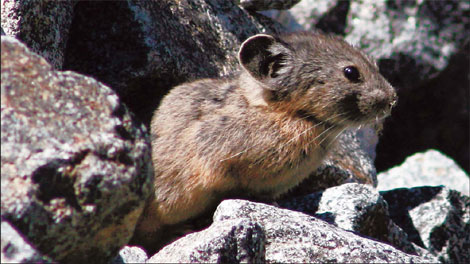Society
Warming up, moving on
Updated: 2011-08-23 08:02
(China Daily)
|
The American pika, a rabbit-like creature that has been studied in Yellowstone National Park for more than a century, didn't go higher than 2,377 meters in 1900, but in 2004 they were seen at 2,895 meters. Provided to China Daily |
A new study says animal species are fleeing the equator and heading north much faster than a decade ago.
Animals across the world are fleeing global warming by heading north much faster than they were less than a decade ago, a new study says. About 2,000 species examined are moving away from the equator at an average rate of more than 5 meters per day, about 1.8 km per year, according to new research published on Thursday in the journal Science which analyzed previous studies.
Species are also moving up mountains to escape the heat, but more slowly, averaging about 1.25 meters a year.
The species - mostly from the Northern Hemisphere and including plants - moved in fits and starts, but over several decades it averages to about 20 cm an hour away from the equator.
"The speed is an important issue," says the study's main author Chris Thomas of the University of York. "It is faster than we thought."
Included in the analysis was a 2003 study that found species moving north at a rate of just more than 500 meters per year and up at a rate of 0.61 meters a year.
Camille Parmesan of the University of Texas, who conducted that study, says the new research makes sense because her data ended around the late 1990s and the 2000s were far hotter.
United States government weather data show the last decade was the hottest on record, and 2010 tied with 2005 for the hottest year on record.
Gases from the burning of fossil fuel, especially carbon dioxide, are trapping heat in the atmosphere, warming the Earth and changing the climate in several ways, according to the overwhelming majority of scientists and the world's top scientific organizations.
As the temperatures soared in the 2000s, the species studied moved faster to cooler places, Parmesan says.
She points specifically to the city copper butterfly in Europe and the purple emperor butterfly in Sweden. The comma butterfly in Britain has moved more than 217 km in 21 years, Thomas says.
It's "independent confirmation that the climate is changing", Parmesan says.
One of the faster moving species is the British spider silometopus, Thomas says. In 25 years, the small spider has moved its home range more than 320 km north, averaging 13 km a year, he says.
Stanford University biologist Terry Root, who wasn't part of this study but praised it as clever and conservative, points to another species, the American pika, a rabbit-like creature that has been studied in Yellowstone National Park for more than a century. The pika didn't go higher than 2,377 meters in 1900, but in 2004 they were seen at 2,895 meters, she says.
For Thomas, this is something he notices every time he returns to his childhood home in southern England. The 51-year-old biologist didn't see the egret, a rather warm climate bird, in the Cuckmere Valley while growing up. But now, he says, "All the ditches have little egrets. It was just a bizarre sight."
Thomas plotted the movement of the species and compared it to how much they would move based on temperature changes. It was a near perfect match, showing that temperature changes explain what is happening to the critters and plants, he says. The match wasn't quite as exact with the movement up mountains and Thomas thinks that is because species went north instead or they were blocked from going up.
Thomas found that the further north the species live, the faster they moved their home base. That makes sense because in general northern regions are warming more than those closer to the equator.
Conservation biologist Mike Dombeck, a former US Forest Service chief, says changes in where species live - especially movements up mountains - is a problem for many threatened species.
Thomas says what he has studied is not about some far off problem.
"It's already affected the entire planet's wildlife," he says. "It's not a matter that might happen in the lifetime of our children and our grandchildren. If you look in your garden you can see the effects of climate change already."
Associated Press
E-paper

Blue economy gets a lift
Coastal areas of Shandong, Zhejiang and Guangdong to spearhead sector development.
The light touch
Long way to go
Outdoor success
Specials

Star journalist remembered
Friends, colleagues attended a memorial service to pay tribute to veteran reporter Li Xing in US.

Hot pots
Tea-making treasures catch the fancy of connoisseurs as record prices brew up interest

Hear we go
Polish Audiologist helps thousands of Chinese hear for the first time.

